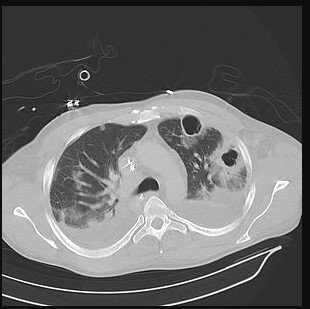Definition
What is a lung abscess?
Lung abscess is a lung infection. This disease causes swelling containing pus, necrotic in lung tissue, and cavity formation containing necrotic granules or as a result of microbial infection. The formation of many abscesses can cause pneumonia or lung necrosis.
How common is lung abscess?
This disease can occur at any age. However, people over the age of 60 are at risk for lung abscess. You can prevent this disease by reducing risk factors. Please consult your doctor for more information.
Signs & symptoms
What are the signs and symptoms of lung abscess?
Symptoms of lung abscess usually occur within a period of weeks to months, which include: fever, chills, sweating, coughing and unpleasant saliva. Patients often experience fatigue, weakness, loss of appetite and weight loss. Sometimes it can produce bloody saliva and chest pain and is exacerbated by coughing and deep breathing. The patient may experience rapid heartbeat, shortness of breath, wheezing, and pleural effusion.
There may be signs and symptoms not mentioned above. If you have concerns about a particular symptom, consult your doctor.
When should I see a doctor?
If you have any of the above signs or symptoms or any other questions, consult your doctor. Each person's body is different. Always consult a doctor to treat your health condition.
Cause
What causes lung abscess?
Inhalation of foreign matter is a major cause of lung abscess. The foreign object is usually food, drink, vomit, or secretions from the mouth that is inhaled into the lungs. Formation of swelling, pneumonia, and abscesses can occur within 7-14 days. Stroke, epilepsy, drug abuse, alcohol, dental disease, emphysema, lung cancer, and oesophageal disorders can cause the inhalation of foreign matter.
Bacteria that cause lung abscess are usually anaerobic (grow without oxygen) and come from the mouth. Other microorganisms such as parasites and fungi can also cause lung infections and cause abscesses.
Risk factors
What increases my risk for lung abscess?
Certain factors that increase your risk of having a lung abscess are:
- Alcoholics;
- Drug abuse;
- Has other conditions such as stroke, epilepsy, and periodontal disease, emphysema, lung cancer and oesophageal disorders
Medication & Treatment
The information provided is not a substitute for medical advice. ALWAYS consult your doctor.
What are my treatment options for lung abscess?
First the doctor will eliminate the microorganisms that cause lung abscess. Then the doctor will treat diseases that cause abscesses such as epilepsy, alcoholics, poor oral hygiene or stroke.
Most patients require intravenous fluids and oral antibiotics for 4-6 weeks. 95% of the patients can be cured, but treatment depends on the cause.
What are the usual tests for lung abscess?
Your doctor will diagnose on the basis of symptoms and chest X-ray. Your doctor may require a tomography on the chest to check for an abscess. Blood and saliva tests can be performed to help identify bacteria or microorganisms that cause abscesses. Your doctor may require bronchoscopy to determine the likelihood of lung cancer if there are signs of material blocking the respiratory tract.
Treatment at home
What are the lifestyle changes or home remedies that can be done to treat lung abscess?
Here are the lifestyle and home remedies that can help you cope with lung abscesses:
- Use all the antibiotics needed.
- Call your doctor if you have epilepsy, pain during swallowing, choking on food when you swallow or fever that lasts more than 7 days after starting using antibiotics.
- Call your doctor if you have any problems with alcohol or drugs.
- Tell your doctor if you have symptoms such as chest pain, fever, coughing up blood, or having problems with medications (red nodules, diarrhea, swollen tongue, wheezing or shortness of breath)
If you have any questions, consult your doctor for the best solution of your problem.

Sounds like a terrible thing to happen
yupz :(, i hope we don't get any disease like that!